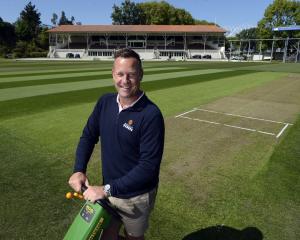Dunedin could face multimillion-dollar competition from New Zealand's largest cities if it opts for a new events fund to lure more big acts to Forsyth Barr Stadium.
The idea gained new momentum when deputy mayor Chris Staynes threw his support behind the move last week, suggesting a new targeted rate on the city's hospitality sector could help pay for the fund.
That followed claims from Dunedin Venues Management Ltd the stadium was missing big events - including an All Whites game - because it could not compete with other cities' incentives.
Dunedin Mayor Dave Cull was yet to commit to the idea, but said it was clear the city needed to "find ways to incentivise events" after DVML confirmed a $3.2 million annual loss last week.
However, even flush with a new fighting fund, Dunedin would still face stiff competition from councils in Auckland, Wellington and Christchurch, which were already investing large - and in some cases growing - sums to secure events.
Auckland had created a new council-controlled organisation for the job, armed with a nearly $10 million annual budget, while Wellington was raising millions through a targeted rate and Christchurch was spending millions more, the Otago Daily Times has found.
Cr John Morrison, a Wellington city councillor, events portfolio leader and Westpac Stadium Trust member, told the ODT major events delivered significant economic benefits, but competition to secure them was increasing.
That was due in part to new or upgraded stadia in main centres - including Dunedin - but also a "more aggressive" attitude from Auckland since the formation of the Super City.
"Auckland is coming to the table with a lot bigger purse than they've ever come with before, and a lot more united.
"We're going to a gun fight with a water pistol when you compare it to Auckland's income and money," he said.
In Dunedin, the city council had $1.189 million for events support in 2012-13, including just $400,000 for major and premiere events like the iD fashion show, council special projects co-ordinator Kim Newman said.
Most of that was already spent, while another $408,000 of the total budget was for civic events like the annual Santa parade, and $50,000 for smaller community events.
Spending for one-off events had previously been approved on top, funded from other budgets, including the cost of last year's Rugby World Cup matches.
In Auckland, by comparison, a new council-controlled organisation, Auckland Tourism, Events and Economic Development Ltd (ATEED), had a $9.7 million budget for 2012-13.
That paid for sponsorships, leveraging and assessing the feasibility of proposals, and included $2.25 million in financial support already allocated to 22 events during 2012-13, a spokeswoman confirmed.
The events included New Zealand Fashion Week, the Heineken Open and ongoing support for the Warriors.
Auckland Council had also previously approved $1.5 million for this year's Volvo Ocean Race stopover, which was deemed a success but also highlighted some of the risks for councils in the events market.
Bad weather cut the 16-day stopover to eight days, while the number of boats arriving dropped from 10 to six, cutting the city's economic return from $10.7 million to $5.9 million, an economic impact report showed.
High-profile flops had also occurred in the past, including in Hamilton, where the city council lost millions supporting the V8 Supercars, and in Auckland, where the former regional council lost $1.79 million supporting a David Beckham exhibition football match in 2009.
However, Cr Morrison said Wellington's hospitality sector was "dead keen" for more events, and paid more rates - through the city's downtown levy - to help secure them.
The targeted rate applied to commercial ratepayers in Wellington's CBD and funded council underwrites, grants and other assistance for event organisers, including those behind an AFL clash in the capital next year and the annual World of Wearable Art event.
Exactly how much was spent each year remained a secret, but it was "in the millions" and provided "terrific value", he said.
Wellington's funding was also set to increase, as a new regional amenities fund created to collect extra contributions from most councils across the region would add an extra $1 million a year initially, possibly rising to $3 million a year in time, he said.
The fund would add to the pot used to attract events to the region, including large concerts to Westpac Stadium.
Christchurch City Council budgeted $1.9 million each year for "icon or major" festivals and events, such as the Ellerslie International Flower Show, but did not have a discretionary or special events fund, council marketing manager Richard Stokes said.
Instead, it had smaller budgets for sporting events and offered non-cash help with marketing, equipment and in other areas, including staff time.
Councillors could also approve additional one-off funding for events, such as $900,000 for this year's New Zealand Open events, council recreation and sports manager John Filsell said.
That meant overall spending could fluctuate from year to year, but he confirmed the council had contributed cash and other support worth $22,000 to secure October's All Whites match - something Dunedin's Forsyth Barr Stadium has so far missed out on.








